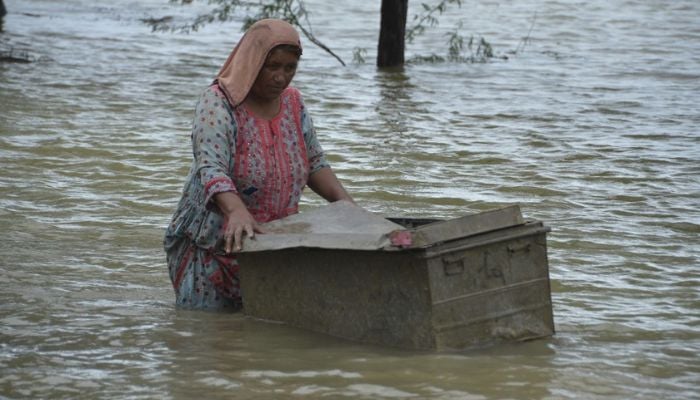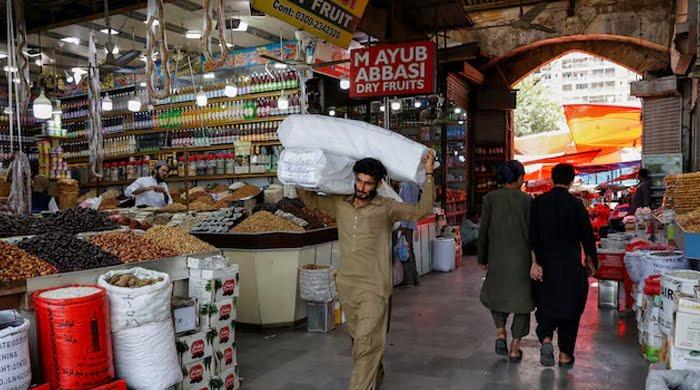Working together when disaster strikes
A nation that is not united even when a disaster of this scale hits is a nation that is doomed to failure
September 02, 2022

The people of Pakistan have seen natural disasters like the 2022 floods before. In 2010 and 2011, devastating floods across the country damaged several parts of each province. Before this, there was the 2005 Kashmir earthquake, which rendered vast swathes of territories in Kashmir and Khyber Pakhtunkhwa (KP) into rubble.
Surprisingly, recovery efforts in these parts are still going on, with a legacy left of people crippled by the earthquake when roof beams and parts of other structures fell on them; unfortunately, they have not been able to recover from their terrible injuries. Children who were victims of the devastating earthquake can no longer run or walk. The promises made at that time have not been fulfilled to date. The hospitals that were supposed to be set up still do not exist, nor do the schools which were supposed to cater to the disabled.
However, an interesting thing that we saw in 2005, and during the subsequent floods or other natural disasters, including a cyclone in Balochistan, was the spirit of national unity. In admittedly disorganized fashion, people in large numbers rushed to the scene of the disaster, attempting to offer whatever help they could. Some took up supplies; some attempted to rescue people, and others collected goods for the affected population.
We have once again seen flash floods sweeping the entire cities and villages away. Pakistan has become one of the world’s first examples of the impacts of climate change and how ruthlessly and quickly it can destroy us. The floods mean that now agricultural patterns will change and farmers at all levels will suffer for years to come. At present, these floods leave behind terrible images of people being taken away by monstrous rivers and of damaged houses and abandoned people most of whom have not received any help for purely political reasons.
The local representatives of some flood-affected areas have reportedly seized relief goods delivered by humanitarian agencies such as the Al Khidmat Trust in order to distribute them themselves and gain political brownie points. Other political games have also been played, all at the cost of the welfare and lives of affected people.
It is also astonishing that while the floods have obviously made headlines in most major newspapers, they are not the only headline. Instead, we have reports of what seems to be insignificant political events at the moment, such as happenings within the PTI or action within parties. These events as well as statements by political leaders are not important at this time. The only focus of the nation and its politicians should be on rescuing flood-hit people and determining why the well-endowed NDMA and the PDMAs have performed so badly in mitigating this disaster.
We must also plan for the future and consider what needs to be done if a future disaster of a similar scale hits us. With climate change tripping across the world, there is every danger that this will happen again at some point in the near future.
The most important question we need to ask is: whatever happened to national unity and humanity? The people who had come together in the past seem to have gone their separate ways. Yes, there are groups that are helping, including groups of young people, but they are working in isolation and the mass concern we saw during past disasters appears to be absent at least to some degree. We wonder if it is the political polarisation of the country which has contributed to this and to blame games. This, of course, is a terrible disaster.
It means that instead of helping those in need of aid, people have fallen into the trap set by political parties, of pointing fingers and accusing each other of being responsible for the disaster. The truth is that no political group is solely responsible for this calamity. The long-term mismanagement of the country is a major factor. The magnitude of this disaster is truly enormous. Sindh has been hit badly with many districts completely devastated, and in Balochistan, in areas such as Lasbela, people are left without food or any supplies for days.
According to some reports received from people on the ground, many children have lined up along roadsides, begging for a single ‘roti’ to quench their hunger. In other cases, the affected have pointed out that despite the launch of rescue helicopters and drones to deliver aid, they have received nothing at all.
This time there is lack of national solidarity and genuine empathy shown for the people who have been affected. There are tens of thousands who have been left homeless, and there are millions who have lost their families or whose houses have suffered great damage. Somehow, empathy has vanished – just as has so much else that was good about our country. There is little explanation for this, except that people are either so caught up in their lives that they simply have no time or no space left in their hearts to deal with the concerns of others. Another reason for this apathy is political polarisation which has split the people so widely apart that they are unwilling to come together as one unit to help everyone in need regardless of political affiliation.
During his visit to Sindh, Prime Minister Shehbaz Sharif heard accusations that PML-N workers were being deliberately discriminated against. To his credit, he did not give much credence to this, and Sindh Chief Minister Murad Ali Shah, who visited flood hit areas several times, has also promised that such behaviour will not happen and given instructions in this regard to district administrations.
But has political polarisation hit us so badly? Can we no longer work together to deal with the concerns of our nation? Can we no longer bring together the forces of young people, architects, doctors and lawyers who rushed in disorganized caravans to Kashmir after the 2005 quake? This is a question we need to ask ourselves.
A nation that is not united even when a disaster of this scale hits is a nation that is doomed to failure. At the moment, politics has no relevance and must be left far behind. Far greater efforts should be made to both highlight the plight of flood-hit people, as is now happening to some degree over the media, and to put together a force to rescue them. We should also be asking what happened to the organisations set up after 2005 to deal with disaster and why they are unable to do so now at this moment when we need them most of all.
The writer is a freelance columnist and former newspaper editor. She can be reached at: [email protected]
Originally published in The News











